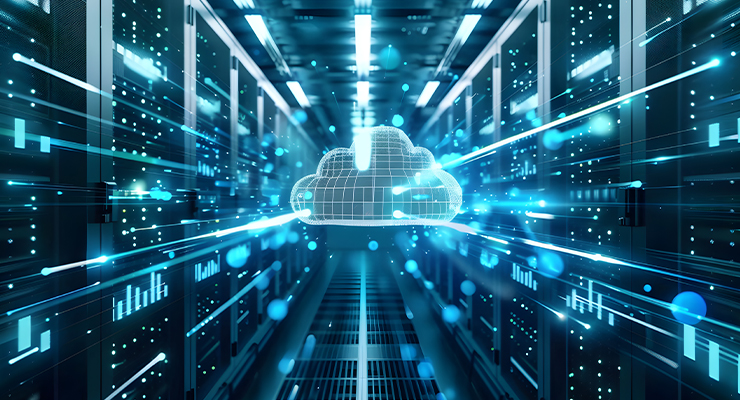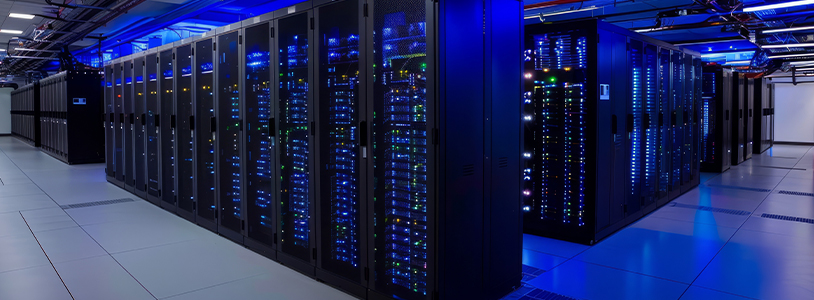Optimize Your Operations in Colocation and Cloud Data Centers
More and more businesses are turning to colocation and cloud data centers to help them store and run their IT systems. However, as the demand for facilities with the latest critical infrastructure grows, many colocation and cloud data centers are struggling to keep up with their tenants’ needs. And if even one piece of this infrastructure fails, every organization using these facilities will suffer.
Ensuring that your colocation and cloud data centers never experience unplanned downtime requires advanced solutions that can keep up with the growing number of organizations using these facilities. Not to mention as more companies start using evolving technology like AI, colocation and cloud data centers need strong solutions to ensure efficiency and prevent system failures. That’s why every colocation data center and cloud computing facility needs reliable critical infrastructure that can meet their expanding needs.


The Role of Critical Infrastructure in Colocation and Cloud Data Centers
The world’s industry relies on your colocation data center and cloud computing facility to run perfectly 24/7 so they can provide necessary services to their clients. But as some tenants adopt new technologies like AI, this quickly strains your facility’s power and cooling systems. Outdated critical infrastructure simply cannot keep up with AI and other new technologies. The longer these older systems are used, the more you put your entire facility at risk of power outages, data loss, and unplanned downtime.
Colocation and Cloud Data Center Challenges
When even one piece of critical infrastructure fails in a colocation data center and cloud computing facility, multiple organizations could lose access to their sensitive data or be unable to operate. There are many challenges colocation and cloud data centers face, and you must be prepared for all of them to prevent serious damage to your operations.
Power Constraints
Since colocation and cloud data centers provide space for multiple organizations’ hardware and data, they need an immense amount of power to ensure equipment operates properly. This means that facilities relying on a single power source can struggle to keep every piece of critical infrastructure running and put you at risk for a total system failure. That’s why these locations need to be built specifically to support power-hungry systems. This includes utilizing redundant power resources along with backup UPS and generators to ensure a power outage doesn’t mean downtime.
Compatibility
Whenever a new organization joins a colocation data center, they bring in their own servers, networking equipment, and computing hardware. These devices will come from various vendors and include older and modern systems. As a result, colocation data centers need to find a way to ensure compatibility with organizations bringing in their unique devices. This includes providing the right size racks, power and cooling systems, and security solutions. A colocation data center’s critical infrastructure can’t just be tailored to one kind of system; it needs to be flexible enough to accommodate equipment brought in from all their customers.
Complex Deployment
Designing colocation data centers requires careful planning so that the finished facilities can accommodate the wide variety of tenants and future expansion as well as any equipment replacements that will happen over time. And with the rise of AI and other high-density computing technologies, colocation and cloud data centers are forced to grow to meet the expectations and needs of their clients. This doesn’t just mean a larger facility with more space is needed. To ensure every tenant’s equipment is working properly, colocation data centers and cloud computing facilities need advanced power, cooling, and security systems in place. As a result, older buildings can rarely be updated to meet these requirements. Instead, new facilities must be designed and built with enough space, power, and cooling to support every tenant’s system.
Benefits of Critical Infrastructure in Colocation and Cloud Data Centers
The more technology advances, the more colocation data centers and cloud computing facilities need to keep up. This has resulted in the rise of high-density data centers, which have more computing power than regular facilities in a smaller space. Instead of having to build a new data center to meet your needs, your facility can easily expand on its own and save you valuable time and money. And since so many organizations rely on these facilities to run smoothly, it’s no wonder that the technology used in them is also growing:
- Remote Monitoring: If even one piece of equipment isn’t working properly in your colocation and cloud data center, countless tenants could lose their hardware and be forced into downtime as you scramble to fix the issue. Remote monitoring and control of critical infrastructure ensures issues are identified and resolved quickly, before they disrupt your tenants’ operations.
- Precision Recording and Reporting: Real-time monitoring creates accurate reports about how every piece of equipment in a colocation data center and cloud computing facility is operating 24/7. This provides you with accurate information about the health of your critical infrastructure so you can prevent problems before they affect service delivery.
- Cost and Time Savings: Being aware of how your colocation data center and cloud computing facility is running will save you time and money in the long run. Critical infrastructure needs to be updated so it can implement the latest technologies like IoT. This may require a higher initial investment, but it will prevent you from having to pay for and fix equipment and inaccurate data records.
Interoperability and Secure Data Transfers
Without reliable critical infrastructure in place, colocation and cloud data centers put their operations at risk. Tenants trust that their servers, networking equipment, and computing hardware will all work like they should and be protected in the process. This means that colocation and cloud data centers need to not only have strong networks of their own in place, but also advanced security systems. These pieces of equipment are what make interoperability not only possible, but safe to utilize. Nevertheless, it’s important to be aware of the pros and cons of interoperability in colocation and cloud facilities so you can integrate it effectively.
Benefits of Interoperability
- Fast Access to Data: Interoperable systems allow colocation and cloud data centers to streamline communication across platforms, sites, and services. This provides data center operators with faster, more accurate access to insights needed to stay ahead of tenants’ demands.
- Operational Efficiency: With interoperability, teams can learn from system behavior across all their sites. Sharing this data between facilities helps operators identify best practices, reduce energy waste, and ensure consistent service delivery regardless of location.
- Better Decisions: System-wide integration gives colocation and cloud data center managers information on critical infrastructure health, power usage, and capacity so they can make data-driven decisions about their facility’s optimization, expansion, and tenant service agreements.
Challenges of Interoperability
- Cybersecurity Risks: Interconnected systems open more endpoints to potential attacks. So, when ransomware or data breaches disrupt one component in a colocation data center and cloud computing facility, multiple tenants will suffer.
- Regulatory Compliance: Colocation and cloud data centers must meet a growing list of compliance requirements across different geographies and industries. Interoperability must be paired with strong critical infrastructure security to prevent data loss, reputational damage, or regulatory fines.
- Insider Threats: Staff misconfigurations, improper system access, and insufficient cybersecurity training can all put your colocation data center and cloud computing facility at risk. After all, the biggest threat to your data is human error, which is why effective interoperability requires ongoing training, access controls, and system safeguards in place.
Colocation and Cloud Data Center Critical Infrastructure Solutions
Many companies rely on your colocation and cloud data centers to keep their operations running smoothly. That’s why we provide critical infrastructure solutions to ensure your facilities are always working. Contact us today to speak with one of our experts about your facility’s needs and learn which solutions are necessary to keep up with increasing tenants and technology.
